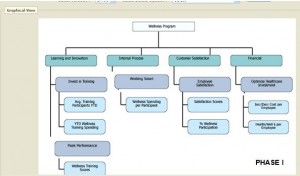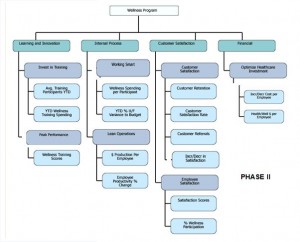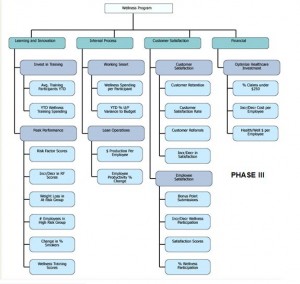Until recently, employee benefits costs—healthcare, in particular—have been considered a necessary cost of doing business, external to a company’s core products or services. An emerging school of thought, however, suggests that employee wellness affects much more than a company’s bottom line as a human resource expense. Wellness also affects absenteeism, productivity and efficiency. In other words, healthy employees are more likely to successfully contribute to a company’s core business than sick or injured employees who are unable to perform at optimal levels.
In this way, wellness does, indeed, contribute to every company’s bottom line and, as a result, needs to be stated as a measurable goal of every company. But how can wellness be quantified?
Isn’t it a subjective measurement? Yes and no. Wellness can actually be measured in a number of different ways, both objectively and subjectively. Some measurement tools include a focus on program participation; efficient program administration; managing healthcare spending; employee productive measures; customer and employee satisfaction; and more. By measuring such items, decision makers cannot only see what effect wellness has on the company’s bottom line, but they can also implement strategies to encourage and emphasize wellness among their employees. A healthy employee is a happier employee!
That said, I have taken on the task, using Aligned Momentum-STRATEGY (Images from former Abrige STRATEGY. Updated version coming soon), to lay out a dashboard by which an employer might manage the expectations and/or success of their Wellness Program. This is a high-level “Impact of our Wellness Program on the Performance of this Company” dashboard built in 3 phases:
Phase I: focus on participation in program, efficient program administration, training and stabilizing healthcare (now combo health/wellness) spending – realizing that all of this will take time so at first the eyes will be on cost containment while the workforce “buys in.” Over time you are seeking more than buy-in; you want commitment. Commitment results in engagement and alignment, leading to greater mental well-being and productivity.

Phase II: expand Phase I measurements to include employee productivity measures, satisfaction with program, impact on (external) customer satisfaction (especially if a call center is involved).

Phase III: expand the Phase II (which is I & II combined) to include risk factor scores (at a high level…when it cascades down or broadcasts out to the organization there will be a person/division/outsourced firm that manages the health info involved in risk factoring) and more detailed scrutiny of healthcare costs and health status trends.

It is the detailed health/wellness info that most Wellness professionals are focused on. Certainly this is important and there needs to be accountability at that level. Also, to engage the power of executive commitment and “Tone at the Top” that any initiative needs in order to succeed, a high level approach must be included…and that’s what this high level dashboard attempts to do.

Lori,
I work with many firms here in Orange County and I agree that a best practice is to consider employee welfare, health and well being a strategic advantage. The firms that look at how to maintain a healthly workforce and not simply consider the healthcare expense an element of the “burdened” cost of their workforce tend to outperform their competitors.
I am glad to you dealing with this topic and hope your readers take some time to look into how to embrace employee wellness as they will certainly see a return on their efforts over the longer term.
Sincerely
Ric Franzi
Owner Executive Forums
Ric,
You are making such a difference for our leaders in your area through your groups – and so much further with your writing. Wellness can make such a difference in their lives, in the lives of those who work for the company…and to the business bottom-line.
-Lori
Just imagine I read it twice. While I am not as proficient on this subject, I harmonise with your determinations because they create sense. Gives Thanks and goodluck to you.
Thanks for visiting the blog, Giovanni. Sometimes what is not so clear now will become quite beneficial as it is applied. -Lori
AmericanHealthJournal is seeking content based partnerships with website owners in the health genre. American Health Journal is a health site with a significant library of high quality health care videos. We can offer content exchanges, link exchanges, and exposure to your brand. Come message us at our contact page on our web site.